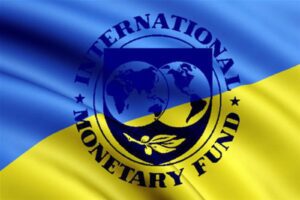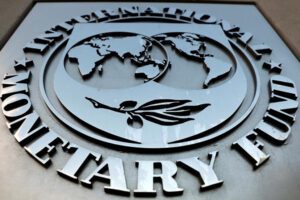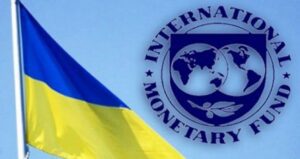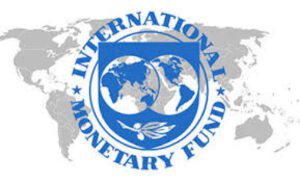
Ukraine has applied to the International Monetary Fund (IMF) for support in covering the financial gap to keep the economy functioning in the amount of $5 billion per month for the next three months, and the IMF will assist in raising these funds, said Fund Managing Director Kristalina Georgieva .
“The first priority is to provide support to fill this financial gap in Ukraine over the next three months,” she said at a press conference in Washington on Wednesday.
“Let me emphasize that this $5 billion is for keeping the economy functioning, not for Ukraine’s recovery needs, which will be huge,” Georgieva added.
She noted that the Fund has worked very closely with the Ministry of Finance of Ukraine regarding these estimates provided by them and there is some uncertainty about this amount, but, according to the IMF, it does not go beyond the likely needs of the country.
“What we are doing is working with our partners to ensure that this kind of support is mobilized through various channels and further work on detailing specific needs and how those needs can best be met,” the IMF chief said.
Georgieva recalled that the Fund has created and will administer a special administrative account to send money from donor countries to help Ukraine. “We already have one contribution to this effect and others can contribute. We look forward to it,” added the Managing Director.
She noted that such large funding for Ukraine is important for obvious reasons: most of the economy is not working, the Fund predicts about a 35% decline in GDP this year. “And so filling this financial gap is best done by relying on grant funding, and this is what we want to see in order to raise funds for Ukraine in search of financial support,” said Georgieva.
According to her, the IMF is already discussing a follow-up program for Ukraine.
“Of course, we have very high uncertainty right now, but it should not prevent us from starting work on a support package for Ukraine in the future,” Georgieva stressed.
She clarified that this program, which the Fund can begin to structure for the future, will not be submitted to the board of directors while hostilities are still ongoing. “Because it is unfair to expect the Ukrainian authorities to develop a massive package of reforms. They are doing the right thing now, focusing on what matters most at the moment, namely keeping the economy functioning, and they are doing a really good job,” said the head of the IMF , expressing admiration for the work of the Ukrainian economic bloc consisting of the Ministry of Finance and the National Bank to maintain macroeconomic and financial stability in the country at war.
As reported, on March 9, the IMF approved Ukraine’s request for $1.4 billion in emergency financing under the Rapid Financing Facility (RFI) and transferred the money to the country the next day.

The International Monetary Fund (IMF) is considering providing $1.4 billion in emergency funding for Ukraine to help it respond to Russia’s invasion, IMF Managing Director Kristalina Georgieva announced on Tuesday.
“Today, we have sent to our Executive Board a proposal they will consider for approval tomorrow for $ 1.4 billion in support for Ukraine, to help it cope with the shock caused by this war,” the IMF said in a statement citing Georgieva.
She said that the IMF also disbursed $700 million to Ukraine in December and has provided a Special Drawing Rights allocation of $2.7 billion that was very handy to Ukraine at this moment.

Ukraine intends to prohibit former owners of failed banks from participating in public procurement and privatization until they take measures to pay off their debts to the Deposit Guarantee Fund, according to a memorandum signed between Ukraine and the International Monetary Fund (IMF).”We will specifically enumerate measures that can be taken to end the state’s business-as-usual with former owners of failed banks until the latter have taken actions to satisfy their debts to the Deposit Guarantee Fund, for example, by prohibiting former bank owners of resolved banks, their related parties, and entities controlled by them, with legally ascertained debts to the Deposit Guarantee Fund, from participating in public procurement and privatization processes,” the document said.According to it, Ukraine is stepping up its efforts to boost asset recovery from the former owners and related parties of failed banks to reduce the cost of bank failures to Ukrainian taxpayers.”We recognize the need to take a more comprehensive approach to pursue all commercial and legal avenues available to recover assets from failed banks and hold former owners and former managers of failed banks accountable for losses. This comprehensive approach would demonstrate a strong political commitment and provide a consolidated view on Ukraine’s asset recovery strategy, on policy measures that will fix institutional, legal and coordination gaps forestalling recoveries with due attention,” the memorandum said.In addition, it undertakes to ensure the impossibility of interfering with the work on the return of PrivatBank’s assets.The new structural benchmark is to prepare a comprehensive asset recovery strategy paper and action plan, which will be adopted and published by the Cabinet of Ministers by end-February 2022.

Ukraine, under the updated memorandum with the International Monetary Fund (IMF), has undertaken to complete and publish an audit of the remaining portion of the funds of the Fund to Fight against COVID-19 spent by Ukravtodor by late 2021.”Complete and publish the audit of the remaining portion of the funds spent out of the COVID-related spending program by end-December 2021,” according to the document released by the IMF on Wednesday.This condition is one of the structural benchmarks of the Stand-By Arrangement.It is clarified that all 100% of the funds allocated for the fight against COVID-19 will not be subject to audit, since the costs of a comprehensive audit in this area by far would outweigh the benefit.”We will complete the audit of the remaining portion of the funds spent out of this budget program – mostly spent by the state road fund [UAH 13.3 billion] – by end-December 2021,” the document said.”While confidentiality agreements with suppliers may not allow for public disclosure of details on some spending, we are currently exploring options to make this possible,” it said.According to the memorandum, following the audit of the COVID-related spending, law enforcement agencies are already considering 212 cases.

Ukraine intends to retain the half of $2.7 billion received in August 2021 from the International Monetary Fund (IMF) during SDR distribution as a buffer against future risks, according to the Memorandum of Economic and Financial Policies of Ukraine signed with the IMF, published by the IMF and the Ministry of Finance on Wednesday.”While the deficit has remained in check, given large gross external financing needs including a significant amount of debt maturing that was issued at concessional rates, we have used about half of the recent general SDR allocation,” the government said in the memo. The government said that this will help to buttress our external stability objectives.

President of Ukraine Volodymyr Zelensky has thanked the IMF for allocating a tranche of $ 700 million to Ukraine under the Stand-By Arrangement.”Grateful to the IMF Board of Governors for the decision to complete the review of the Stand-By program on the allocation of a tranche of about $ 700 million. We’ll use these funds to support the financial system and combat COVID-19 consequences. The IMF program will be continued,” the president said on Twitter.